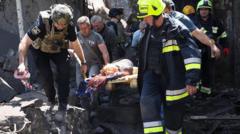As the situation in Ukraine remains fraught with complexity, Secretary of State Marco Rubio's recent decision to abstain from the next phase of cease-fire discussions signals potential setbacks in the ongoing negotiations. On Tuesday, Ukraine's President Volodymyr Zelensky publicly rejected a significant aspect of a proposal put forth by U.S. President Trump, particularly concerning the recognition of Crimea as part of Russia.
Rubio Skips U.S.-Ukraine Cease-Fire Talks Amidst Tensions Over Crimea

Rubio Skips U.S.-Ukraine Cease-Fire Talks Amidst Tensions Over Crimea
Negotiations for a cease-fire in the Ukraine conflict face new challenges as U.S. Secretary of State Marco Rubio withdraws from talks and Ukraine rejects key proposals from the U.S.
This development follows a meeting in Paris where negotiators from the U.S., Europe, and Ukraine gathered to frame a cease-fire agreement. Rubio’s absence from the forthcoming meeting in London raises concerns about the progress of peace discussions that have persisted throughout the three-year conflict.
During the Paris talks, Rubio expressed signs of increasing impatience from Trump regarding the pace of these negotiations, indicating a possible shift in focus toward other matters. The proposal presented suggested that Ukraine must acknowledge Russian claims over Crimea, as well as excluding Ukraine from NATO membership—terms that have been met with fierce opposition from Ukrainian officials.
In response to the tensions and demands raised, Zelensky reaffirmed Ukraine's stance, stating, "There’s nothing to talk about here. This is against our Constitution," highlighting the impossibility of legally recognizing Crimea’s annexation. His firm position reflects the deep-rooted grievances held by Ukraine concerning territorial integrity and national sovereignty.
With ongoing hostilities and recent violent escalations, including missile strikes leading to civilian casualties, the stakes remain high for all parties involved. As international actors continue to navigate this intricate landscape, the future of peace talks appears to hang in a delicate balance, now complicated further by the withdrawal of U.S. leadership in the discussions.
The upcoming discussions in London may prove crucial in determining whether the fractured negotiations can bridge the divide or if further discord will ensue in this protracted conflict.
During the Paris talks, Rubio expressed signs of increasing impatience from Trump regarding the pace of these negotiations, indicating a possible shift in focus toward other matters. The proposal presented suggested that Ukraine must acknowledge Russian claims over Crimea, as well as excluding Ukraine from NATO membership—terms that have been met with fierce opposition from Ukrainian officials.
In response to the tensions and demands raised, Zelensky reaffirmed Ukraine's stance, stating, "There’s nothing to talk about here. This is against our Constitution," highlighting the impossibility of legally recognizing Crimea’s annexation. His firm position reflects the deep-rooted grievances held by Ukraine concerning territorial integrity and national sovereignty.
With ongoing hostilities and recent violent escalations, including missile strikes leading to civilian casualties, the stakes remain high for all parties involved. As international actors continue to navigate this intricate landscape, the future of peace talks appears to hang in a delicate balance, now complicated further by the withdrawal of U.S. leadership in the discussions.
The upcoming discussions in London may prove crucial in determining whether the fractured negotiations can bridge the divide or if further discord will ensue in this protracted conflict.





















